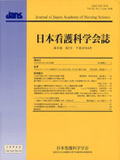Japanese
English
- 販売していません
- Abstract 文献概要
- 参考文献 Reference
- サイト内被引用 Cited by
要旨
自己表出行動の操作や対人態度の傾向が,バーンアウトとどのように関係しているのかを明らかにすることを目的に,全国の緩和ケア病棟に勤務する看護師を対象に郵送による質問紙調査を行った.質問紙には日本語版バーンアウト尺度,セルフ・モニタリング尺度,他者意識尺度,情動的共感性尺度,内的作業モデル尺度の5つの尺度を使用した.
対象全体では,バーンアウト得点が高いとより不安定な対人関係を示し,他者への意識がその人の外面に向きやすく感情的な影響も受けやすいこと,年齢・看護師経験が低く同居をしていない割合が高いことが示された.20歳代・30歳代・40歳代の年代別分析では,年代が異なってもバーンアウト得点の高いほうが社交性が乏しく,内的作業モデルの表象は安定したものではなく,共感時には暖かい反応が乏しくより冷淡であるという示唆が得られた.しかしバーンアウトに陥っている群の中では,バーンアウトの程度ではなく年代によって自己表出行動の操作や対人態度の傾向がそれぞれ異なっており,他の年代と比べて特に20歳代に違いがみられた.
Abstract
The purpose of this study is to determine the relationship among the control of self-expression activities, patterns of interpersonal attitudes and burnout. A mail survey questionnaire was distributed to nurses working at 76different palliative care units (N =782).
The questionnaire consists of 5 scales: Japanese version the Maslach Burnout Inventory (MBI), Self-Monitoring Scale, Other-Consciousness Scale. Emotional Empathy Scale, and Internal Working Model Scale.
Overall, nurse with higher scores on the MBI were likely to be more unstable interpersonal relationships, more concerned about the outward appearance of others, and more susceptible to emotion. This tendency was stronger among young and less experienced nurses who lived alone.
Copyright © 2006, Japan Academy of Nursing Science. All rights reserved.


